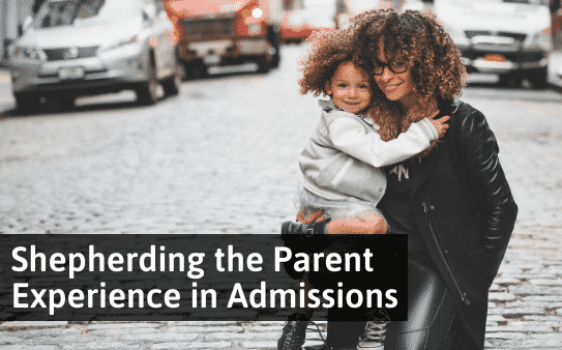In a recent Blackbaud K–12 eBook, The Parent Perspective, author Chuck English explores parents’ views on their relationships with the independent schools their children attend and how it impacts enrollment decisions. The prevailing consensus is that there is a correlation; however, the degree to which the parent experience influenced decision-making varied from family to family.
Where one parent said, “My experience as a parent was almost the exclusive factor in choosing a school,” another interviewee saw the parent experience as a secondary aspect: “Nothing trumps the student experience, no matter the parent experience. But when the kid’s experience isn’t ideal, and the parent experience is not ideal, that may lead to a decision to leave.”
While the parent experience encompasses all factions of independent schools, and the responsibility of parent delight falls on the collective whole, this caretaking begins with admissions where first-impressions are critical.
“It was the interview process and our meeting with the admissions director that was the difference,” one parent told English. “It was rich, warm, and welcoming.” Conversely, another parent shared how meeting admissions changed their thinking. “This was the school we thought we wanted the most, but we had the weirdest interview with the head of admissions. She wanted us to ask questions as opposed to telling us about the school. In the end, it didn’t make us feel good about the school.”
The eBook is eye-opening regarding the persuasive power of personalization during the admissions process. “When we walked on campus, people who represented areas of my son’s interests knew my name and were ready to talk to me,” one parent said.
In an age where Amazon and Netflix have a sixth sense about our preferences, the bar for personalization is high, and schools should take heed that even the slightest hiccup during admissions can be significant. “They sent a thank you letter after our visit but spelled my son’s name wrong. That gave me insight into what might be a disorganized school or how they might treat my child.”
After schools have garnered interest through stellar marketing programs or word-of-mouth referrals, English’s research makes it clear that admissions offices have the opportunity to win the trust of parents by tending to their experience during the enrollment process. Good or bad, these early interactions provide a barometer for what parents can expect from the school.
“All of the personal approaches contributed hugely to our decision. We could tell right away it was a place where they were going to wrap my kid up, love him, and educate him.”
At Blackbaud K–12, we have long recognized our role and responsibility in shepherding the parent experience for our schools. In fact, the development of our education management solutions began with research centered on parent focus groups. Blackbaud Enrollment Management System™ specifically brings the parent experience to the forefront by
- Providing a mobile-friendly interface throughout the entire process;
- Delivering conditional logic on inquiry and application forms for the school to personalize questions;
- Highlighting the application checklists that clearly show parents where they are in the admissions process;
- Offering the ability for parents to self-schedule tours and interviews, eliminating tedious back-and-forth emails and phone calls;
- Displaying school activities on the admission calendar, which enable parents to select tour dates that feature events matching their child’s interests;
- Improving communication with built-in notifications and reminders; and
- Integrating with Blackbaud’s tuition and billing solution, preventing parents from having to complete multiple contracts.
For schools fully connected with Blackbaud’s K–12 solutions, the greatest benefit occurs after enrollment, where parents continue to use the same login to access the learning management and student information systems, along with directories, calendars, and information-rich resource boards. This continuity empowers our schools to maintain the high level of communication and personalization that parents expect.
“We were so impressed with the email communication, the check-in from advisors, the fact people were always willing to talk to us, and that teachers want to know what parents’ concerns are,” one parent said. Another parent summed it up perfectly: “It felt much more personal like we were part of a family. That’s something that wasn’t true at the other high school our kids attended.”
Click here to read the original article posted by Daren Worcester on SchneiderB Media on Jan 15, 2020.






